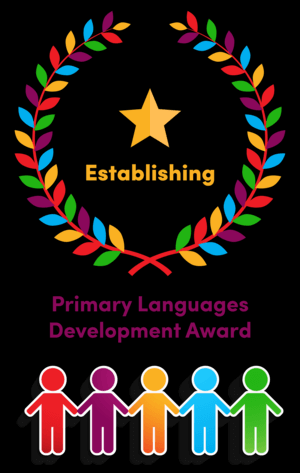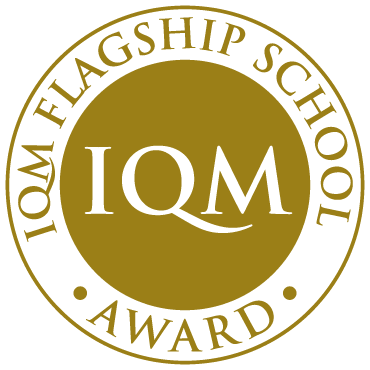MFL
Modern Foreign Languages (MFL)
- Welcome to Park End Primary School
- Bienvenidos a la Escuela de Park End
- Bienvenus à Park End
- Willkomnen in Park End Grundschule
Aims
At Park End Primary School we aim to ensure that all pupils:
- Understand and respond to spoken and written language.
- Speak with increasing confidence, communicating what they want to say and improving their accuracy and punctuation.
- Can write at varying lengths for different purposes.
- Discover and develop an appreciation of the languages studied.
Intent
At Park End Primary School, our intent is to develop the confidence and competence of each child in the foreign language they are learning. Our goal is for them to be passionate, curious, and confident about their own foreign language learning abilities when they finish the primary school phase of their education.
We aim to ensure that pupils of all abilities develop solid foundations in these key language learning skills – properly preparing them for the next stage of their language learning journey. These skills will develop children’s ability to understand what they hear and read and enable them to express themselves in speech and writing. We will extend their knowledge of how language works and explore the similarities and differences between the foreign language they are learning and English. We will also help strengthen their sense of identity through learning about culture in other countries and comparing it with their own.
At Park End Primary School, we intend to use the Language Angels scheme of work and resources to ensure we offer a relevant, broad, vibrant, and ambitious foreign languages curriculum that will inspire and excite our pupils using a wide variety of topics and themes. All pupils will be expected to achieve their full potential by encouraging high expectations and excellent standards in their foreign language learning – the ultimate aim being that pupils will feel willing and able to continue studying languages beyond key stage 2.
The intent is that all content will be continuously updated and reviewed annually, creating a dynamic programme of study that will be clearly outlined in both long-term and short-term planning. This will ensure that the foreign language knowledge of our pupils progresses within each academic year and is extended year upon year throughout the primary phase and, in so doing, will always be relevant and in line with meeting or exceeding national DfE requirements.
We have chosen this approach as we are early in our learning journey with teaching modern foreign language. Our aim, once embedded successfully, will be to adopt a more contextualised sequence of learning that is more personalised for the children within our school.
Implementation
Planning is taken from the Language Angels scheme which follows progressive units that directs, drives and guarantees progressive learning and challenge. This will progressively develop pupil skills in foreign languages through regularly taught and well-planned weekly lessons in the Spanish language which will be taught by class teachers with support from a language specialist teacher. Even though teachers use using the Language Angels scheme of work and planning, they have the freedom to supplement this with their own ideas and experience.
Pupils will continuously build on their previous knowledge as they progress in their foreign language learning journey through the primary phase. Previous language will be recycled, revised, recalled and consolidated whenever possible and appropriate.
We will help them develop and demonstrate substantial progress in the 5 key language skills or ‘big ideas’ necessary for learning Spanish
- Speaking
- Listening
- Reading
- Writing
- Grammar
Through focus on these five big ideas, children will progressively acquire, use and apply a growing bank of vocabulary, language skills and grammatical knowledge organised around age-appropriate topics and themes – building blocks of language into more complex, fluent and authentic language.
The lessons taught are designed to motivate, captivate and interest children from the first moment. They have clear, achievable objectives and incorporate different learning styles. SEN children have access to the curriculum through variation of task, grouping or support from an adult.
To ensure the above is achieved, Spanish lessons will include a variety of
- PowerPoints and interactive whiteboard materials
- Interactive games
- Songs & raps
- Differentiated desk-based consolidation activities
Units of learning are split into four strands: grammar concepts, Early Language, intermediate language or progressive learning units. Early Learning units will start at basic noun and article level and will teach pupils how to formulate short phrases. By the time pupils reach Progressive units they will be exposed to much longer text and will be encouraged to formulate their own, more personalised responses based on a much wider bank of vocabulary, linguistic structures and grammatical knowledge. They will be able to create longer pieces of spoken and written language and are encouraged to use a variety of conjunctions, adverbs, adjectives, opinions, and justifications. It is worth noting that currently due to us being at the beginning of our learning journey, all year groups will begin at the Early Learning unit to build a solid foundation for their language learning. Despite this, Pupil learning and progression will be assessed at regular intervals in line with school policy to ensure that where appropriate, children are moved onto the correct unit for their understanding.
Impact
Because learning is a change to long-term memory, it is impossible to see impact in the short term. Therefore, we look at impact in Modern Foreign Language through the following:
- The use of formative teacher assessment
- Pupils will be assessed against the national curriculum statements
- Comparing children’s work over time
- Pupils have a richer vocabulary and are able to respond in more depth in a variety of contexts
- Pupils’ discussions about their learning
Useful links
To view our MFL policy click here
If you would like to discuss our curriculum in more detail, please contact Sharon Armes, Deputy Head Teacher and Curriculum Leader.










